Swamp Rose, Marsh Rose - Rosa palustris
|
Rosa palustris - Swamp Rose, Marsh Rose. Rosa palustris is found in every state east of the Mississippi River, as well as 4 states on the west side of that river. It is also found in eastern Canada. As the common names indicate, it is a shub of wetlands that grows up to 7 feet tall, and will even grow in standing water. Similar Rosa virginiana is a plant of drier ground.
Found in:
AL, AR, CT, DC, DE, FL, GA, IA, IL, IN, KY, LA, MA, MD, ME, MI, MO, MS, NC, NH, NJ, NY, OH, PA, RI, SC, TN, VA, VT, WI, WV
Leave comments on Rosa palustris at this link. | 
Distribution of Rosa palustris in the United States and Canada:

Blue=Native; Grey=Introduced
Map from USDA Plants Database:
USDA, NRCS. 2017. The PLANTS Database (http://plants.usda.gov, 08 May 2025). National Plant Data Team, Greensboro, NC 27401-4901 USA.
Search Our Database: Enter any portion of the Scientific, Common Name, or both.
Do a general Google search of the entire site:
#ad
 Follow USWildflowers on Twitter
#ad
| | Site: Riverwalk, Amnicola Marsh, Hamilton County, TN Date: 2013-June-24 | Photographer: Gerald C. Williamson
Nikon D7000
Tamron SP 90MM f/2.8 AF Macro | | The fragrant, pale pink blossoms of Swamp Rose are up to about 2 inches across. While frequently solitary at the end of the stem, there may be several blossoms in each inflorescence. It blooms for 6 to 8 weeks usually in June through July. Each of the 5 petals is notched at the end, although that is not easily seen in this photo. | | 
| | Site: Riverwalk, Amnicola Marsh, Hamilton County, TN Date: 2013-June-24 | Photographer: Gerald C Williamson
Nikon D7000 | | The hypanthium of Rosa palustris is reported to have more than 86 glands. I didn't count them. | | Click on the photo for a larger image
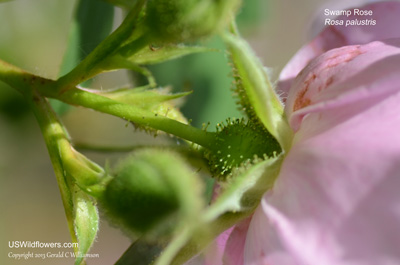
| | Site: Riverwalk, Amnicola Marsh, Hamilton County, TN Date: 2013-June-24 | Photographer: Gerald C Williamson
Nikon D7000 | | The number of leaflets on a leaf is frequently a key for identifying members of Rosa. Rosa palustris usually has 5 or 7 (more frequently 7) leaflets. The leaflets have many small teeth on them - each side of the terminal leaflet usually will have 20 to 30 small teeth. Similar Rosa virginiana has slightly larger teeth, generally fewer than 20 per side. What you see here in the background are co-habitant blackberries, not rose hips, although the fleshy fruit of Swamp Rose are a good food source for birds. | | Click on the photo for a larger image
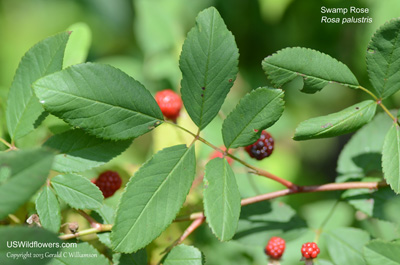
| | Site: Riverwalk, Amnicola Marsh, Hamilton County, TN Date: 2014-January-12 | Photographer: Gerald C Williamson
Nikon D7000 | | The fruit (hips) of Rosa palustris are about 1/2 inch across. Note that the glands found on the hypanthia during inflorescence remain on the fruit. | | Click on the photo for a larger image
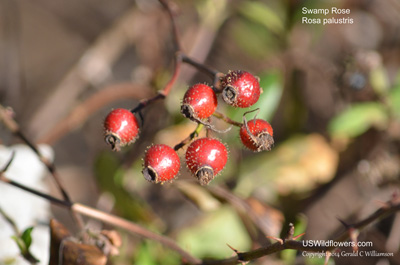
| | Site: Riverwalk, Amnicola Marsh, Hamilton County, TN Date: 2013-June-24 | Photographer: Gerald C Williamson
Nikon D7000 | | The stipule on the petiole of Rosa palustris is long, narrow, and winged. Those of Rosa virginia are wider, almost giving the appearance of another pair of leaflets. | | Click on the photo for a larger image
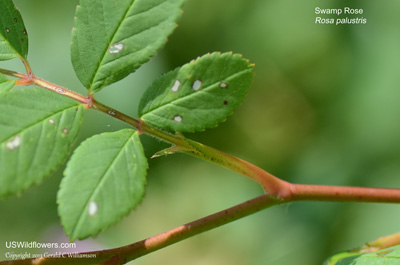
| | Site: Riverwalk, Amnicola Marsh, Hamilton County, TN Date: 2013-June-24 | Photographer: Gerald C Williamson
Nikon D7000 | | While the new stems of Swamp Rose do not have prickles, the older branches do have curved (although this one only slightly) or hooked prickles. | | Click on the photo for a larger image
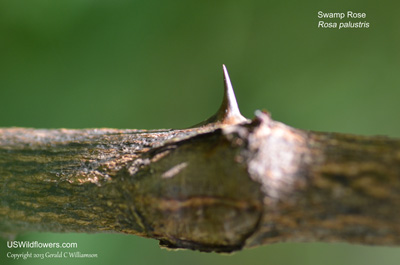
|
References used for identification and information:
|
|
| |
| #ad
|
|








